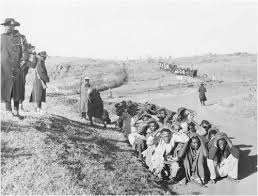Three elderly Kenyans were granted the right on friday to sue the British government for compensation over allegations of torture during the Mau Mau uprising that started 60 years ago.
The judgment at the High Court in London, described as "historic" by
the Kenyans' lawyer, potentially opens the door to other claims of
mistreatment by colonial officers across the British Empire stretching back
decades.
The Foreign Office said it did not dispute that Kenya's colonial
administration tortured the three Kenyans, all in their 70s and 80s, but
added that it would still appeal against the ruling.
It claims that most of the potential witnesses to any court proceedings are
dead, that too long has passed for a civil case to be brought, and that a
fair trial would be impossible.
However Mr Justice McCombe, sitting in the High Court, said documentary
evidence culled from imperial files was "voluminous".
"The governments and military commanders seem to have been meticulous
record keepers," he said.

"I have reached the conclusion that a fair trial on this part of the case
does remain possible and that the evidence on both sides remains
significantly cogent for the Court to complete its task satisfactorily."
The three claimants, Paulo Muoka Nzili, 85, Wambuga Wa Nyingi, 84, and Jane Muthoni Mara, 73, allege that they suffered beatings, castration and sexual assault during their detention by British troops during the rebellion. The uprising, between 1952 and 1960, led to thousands of Kenyans being interned under suspicion of being members of the outlawed Mau Mau sect, which fought the colonial administration.
Mr Nzili, Mr Wa Nyingi and Mrs Mara all want an apology from the British government and compensation for injuries they suffered and lifelong complications that followed.
"I hope that this means that the British government will finally come here to give us something to support our families and to help us," Mr Wa Nyingi told The Daily Telegraph in Nairobi.
Dozens of elderly Kenyans gathered in the Nairobi offices of a human rights organisation's offices to hear the judgment, and ululated, clapped and danced when it was announced.
Gitu wa Kahengeri, the head of the Mau Mau Veterans' Association, said it was "disappointing" that the Foreign Office was to appeal.
"It seems that their strategy is to continue to fight this thing on legal technicalities until we die," he said.
Martyn Day, a lawyer for the three Kenyans, said the judgment was "historic" and would "reverberate around the world".
The three claimants, Paulo Muoka Nzili, 85, Wambuga Wa Nyingi, 84, and Jane Muthoni Mara, 73, allege that they suffered beatings, castration and sexual assault during their detention by British troops during the rebellion. The uprising, between 1952 and 1960, led to thousands of Kenyans being interned under suspicion of being members of the outlawed Mau Mau sect, which fought the colonial administration.
Mr Nzili, Mr Wa Nyingi and Mrs Mara all want an apology from the British government and compensation for injuries they suffered and lifelong complications that followed.
"I hope that this means that the British government will finally come here to give us something to support our families and to help us," Mr Wa Nyingi told The Daily Telegraph in Nairobi.
Dozens of elderly Kenyans gathered in the Nairobi offices of a human rights organisation's offices to hear the judgment, and ululated, clapped and danced when it was announced.
Gitu wa Kahengeri, the head of the Mau Mau Veterans' Association, said it was "disappointing" that the Foreign Office was to appeal.
"It seems that their strategy is to continue to fight this thing on legal technicalities until we die," he said.
Martyn Day, a lawyer for the three Kenyans, said the judgment was "historic" and would "reverberate around the world".

